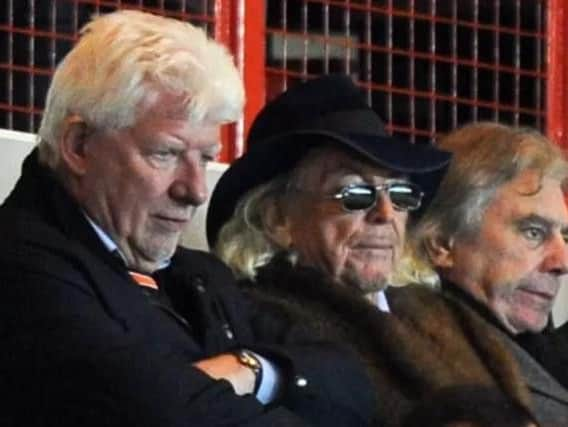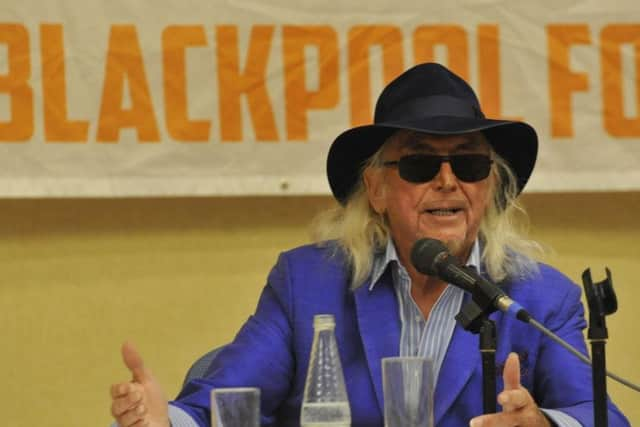Oyston accused of '˜game-playing' in latest court rumpus


The addresses of land and property identified by solicitors acting for Blackpool FC minority shareholder Valeri Belokon were detailed to the Court in London and confirmed.
A charging order means debt is secured against property owned by the debtor.
Advertisement
Hide AdAdvertisement
Hide AdAlthough those charging orders were not opposed by the Oystons, Owen Oyston did challenge Mr Belokon’s application for additional costs to be awarded because of the complex investigation needed.


Mr Justice Marcus Smith, however, awarded Mr Belokon an extra £15,000 on top of the fixed costs normally associated with such orders, bringing the total amount to be paid by Owen Oyston to £23,000.
Karl Oyston’s fixed cost bill is £7,900.
Owen Oyston’s land assets which now have a legal charge over them are: Quernmore Park Hall, Lancaster; Capricorn Cottage, Claughton; a property Lord Street, Fleetwood; a property on Victoria Road West, Cleveleys; five properties in Queen Square, Blackpool; three in The Strand, Blackpool; five on the Promenade, Blackpool; a garage on the Promenade; a property on Edward Street, Blackpool, one in Tewkesbury Drive, Lytham; two in Coronation Road, Blackpool and St Chad’s Church, Lancaster.
Securities charged against his shares are: 1,604,694 ordinary shares in Blackpool Football Club (Properties) Ltd; 3,500,002 ordinary shares in Oyston Estates Ltd; 744,100 ordinary shares in NatFarm Ltd; 500 ordinary A shares in Closelink Ltd; two ordinary shares in Denwis Ltd; and two ordinary shares in Zabaxe Ltd.


Advertisement
Hide AdAdvertisement
Hide AdThe judge’s order concerning Karl Oyston relates to one ordinary share in Biomass Boilers Ltd.
Fraser Campbell, representing Mr Belokon, argued that higher costs should be awarded because “this matter is very far removed from routine debt collection exercise.”
He said an enormous amount of work had had to be done from scratch – contacting banks, building societies, mortgagees and leaseholders, scrutinising affidavits and witness statements.
“That work has borne fruit. It has revealed for example Owen Oyston’s ownership of three properties.”
Advertisement
Hide AdAdvertisement
Hide AdMr Campbell said letters from Mr Oyston had arrived at the last minute, “seeking to apply pressure and to say we will go along with that part of the enforcement process if you agree to give up your rights in respect of another enforcement”.
He stressed that Mr Belokon’s position remained the same as stated in the past – “he will not seek any enforcement against the assets of Blackpool Football Club but his hands are untied as to various different assets of Mr Oyston.”
He added: “But Mr Oyston sought to leverage this process and sought to gain from this process.”
Mr Campbell said in a letter Mr Oyston suggested that somehow the football club’s interests ought to be invoked and there’s some peril there, but the football club is very substantially in funds.
Advertisement
Hide AdAdvertisement
Hide AdHe added: “It was another attempt by Mr Oyston to simply cause Mr Belokon to lose interest and go away and leave him be.”
The barrister said Mr Oyston was using his solicitor “to drag things out and exert pressure”.
He described him as “game playing” and said Mr Belokon was concerned about the pattern of behaviour.
It was likely that Mr Belokon would be seeking further court hearings in respect of similar applications.
Advertisement
Hide AdAdvertisement
Hide AdOliver Phillips, for Owen Oyston, argued that the higher costs application should not be allowed because the other side had not followed the court’s strict timetable for service of documents.
He said Mr Oyston was entitled to make offers as a compromise. His offer that the monies – put at about £550,000 - from the third party debt orders should go to the football club was on the basis it would provide a very substantial security to it.
“But Mr Belokon wants it to go to him not to the club. He is entitled to take that position. There’s nothing wrong in Mr Oyston proposing it.”
Mr Justice Marcus Smith, in giving his decision, said there was no reason why Mr Oyston shouldn’t seek to compromise or negotiate these matters.
Advertisement
Hide AdAdvertisement
Hide AdHe accepted that communications from Mr Oyston put the other side on “something of a war footing” in order to prepare for today’s hearing.
But it was not right that Mr Oyston should pay for Mr Belokon’s choice to use his solicitors Clifford Chance.
“On the other hand I do take the point that this is a very complicated matter which requires detailed and careful investigation.”
If Mr Oyston had been “clearer” in the information he gave the court when an order was made to freeze his assets “then the process might have been a little more straightforward”.
Advertisement
Hide AdAdvertisement
Hide AdFor those reasons it was appropriate that costs were awarded beyond the usual regime, concluded the judge.
He said £15,000 reflected the significant investigative work required to identify targets and extra work preparing for the hearing.